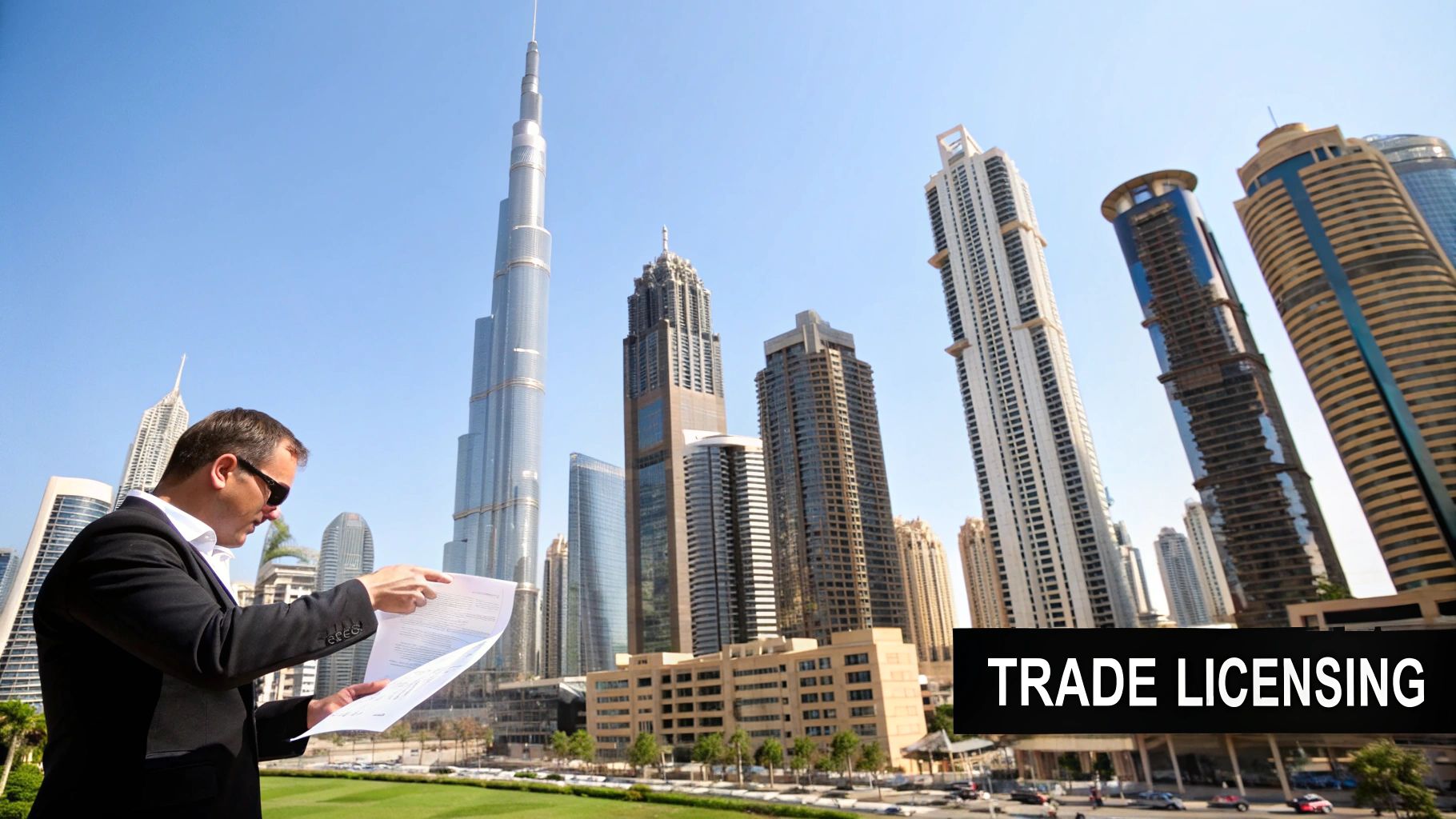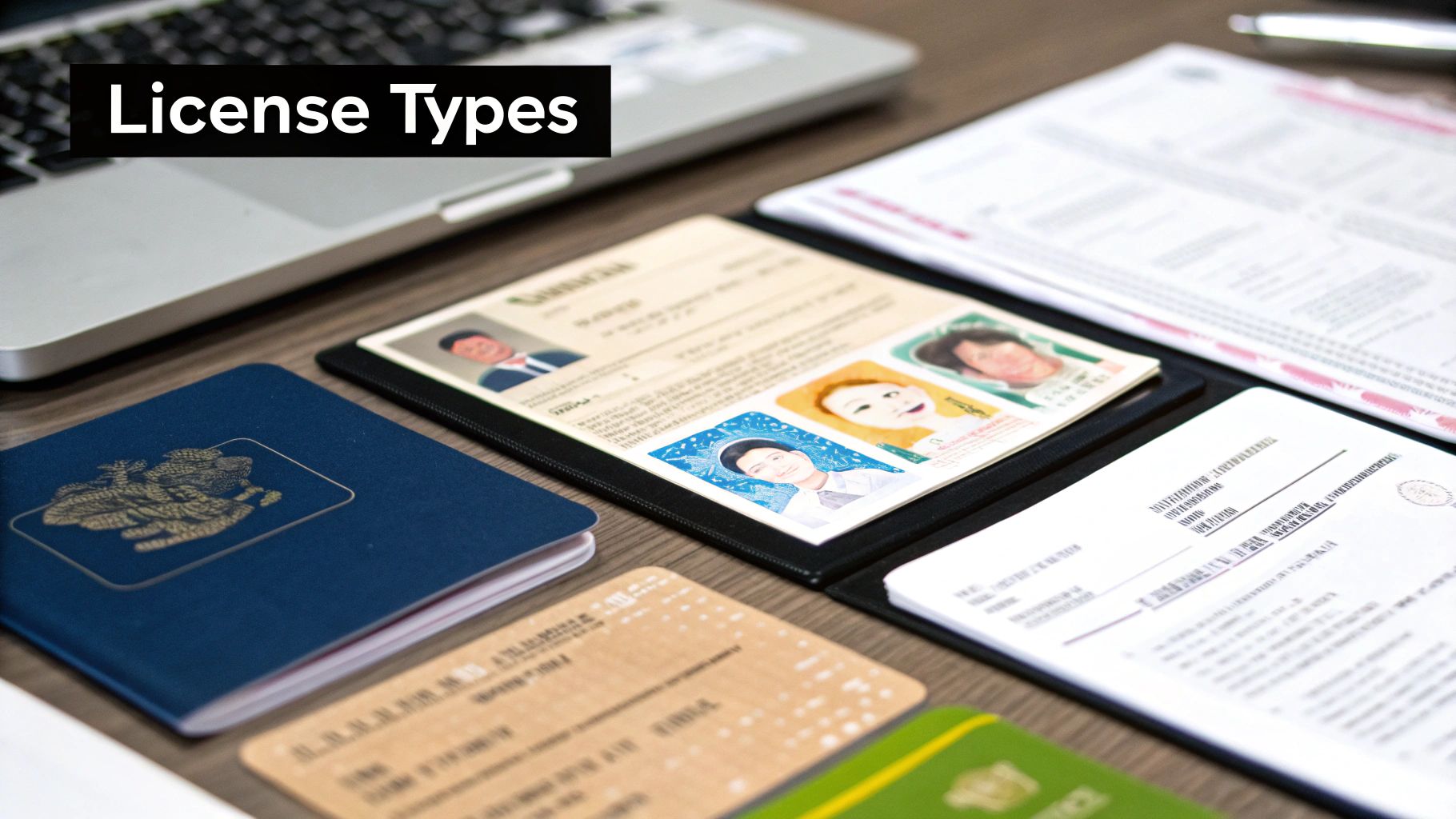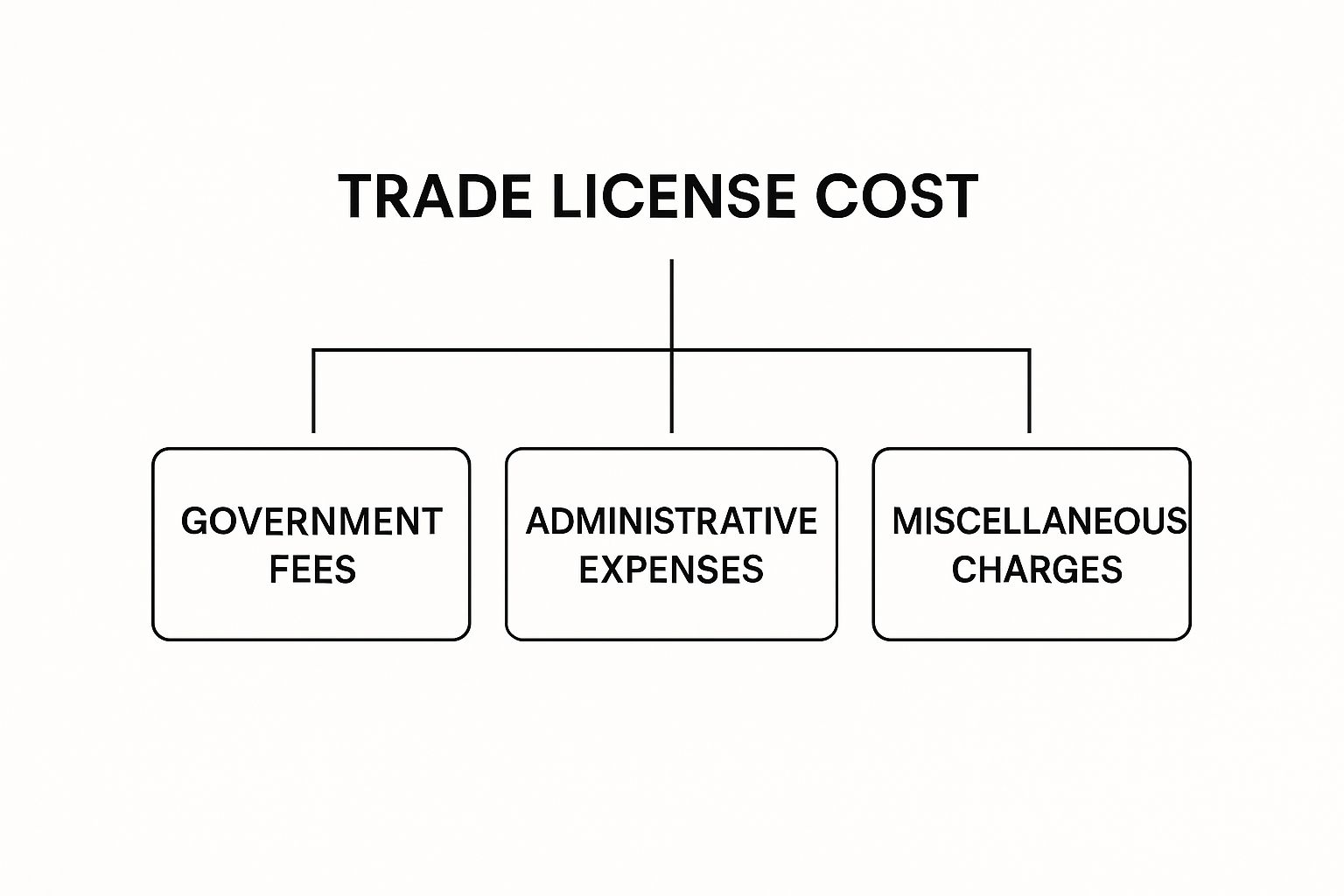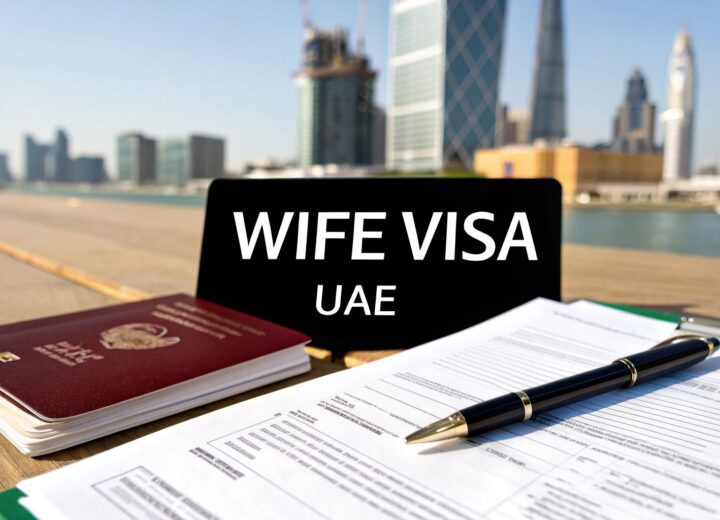Thinking about the trade license cost in Dubai? It's not a simple one-size-fits-all price tag. The reality is, you're looking at a range, typically from AED 15,000 to over AED 50,000. Think of it like buying a new car—the final bill depends entirely on the features and customisations you choose for your business.
Understanding Your Initial Investment

To figure out the real cost of your Dubai trade license, you need to look past a single fee. It's more of a calculation, and every decision you make at the start of your journey will influence the final number. Each choice directly hits your startup budget and shapes the financial ground your company stands on.
The biggest influencers? Your chosen business activities and the legal structure of your company. It makes sense, right? A general trading license for importing and exporting goods will have a completely different cost breakdown than a specialised consultancy or a local e-commerce shop. In the same way, setting up a Limited Liability Company (LLC) involves different steps and fees than going it alone as a sole proprietor.
Core Factors That Shape Your License Cost
Your budget is going to be directly affected by a few key decisions. Getting a handle on these from day one helps you build a realistic financial plan and, more importantly, avoid nasty surprises down the road.
These are the main cost drivers:
- Jurisdiction Choice: This is the big one. Deciding between a Mainland or Free Zone setup will have the most significant impact on your costs. Mainland companies give you unrestricted access to the entire UAE market, while Free Zones offer unique perks like 100% foreign ownership.
- Business Activities: The kind of business you're in determines whether you need a commercial, professional, or industrial license. Some activities, like healthcare or education, also require special approvals from external ministries, which adds another layer of cost.
- Company Structure: The legal form your business takes—whether it's an LLC, a branch of a foreign company, or something else—shapes the required paperwork and the associated government fees.
To help you get a clearer picture, here’s a quick breakdown of what you can generally expect.
Estimated Initial Trade License Costs in Dubai
This table provides a quick overview of the estimated cost ranges for different license types and jurisdictions in Dubai, helping you quickly identify where your business might fall.
| License Category | Mainland (DED) Estimated Cost | Free Zone Estimated Cost |
|---|---|---|
| Professional License | AED 15,000 – AED 30,000 | AED 12,000 – AED 25,000 |
| Commercial License | AED 20,000 – AED 50,000+ | AED 15,000 – AED 40,000 |
| E-commerce License | AED 18,000 – AED 35,000 | AED 10,000 – AED 25,000 |
| General Trading License | AED 30,000 – AED 60,000+ | AED 25,000 – AED 50,000 |
Keep in mind, these are ballpark figures. The final cost will always depend on the specifics of your business setup.
Establishing a Realistic Budget
To properly budget for your new venture, you need a clear financial starting point. Generally speaking, the cost of getting a trade license in Dubai falls somewhere between AED 15,000 and AED 50,000 (which is roughly USD 4,083 to USD 13,613). Commercial licenses, being the most common, typically land between AED 12,000 to AED 50,000, with extra fees tacked on depending on your specific activities and where you choose to set up.
As specialists in Mainland, Freezone, and Investor Visa services, we provide tailored, cost-effective business setup solutions that ensure you meet all regulatory requirements while optimising your initial investment.
If you’re looking for a wider view of the initial steps involved, this guide to setting up a business in Dubai offers some great insights that go beyond just the license fee. We've set the stage here, and as we go on, we'll get into the nitty-gritty of how specific choices, like picking between Mainland and a Free Zone, directly affect these numbers.
Mainland vs Free Zone: The First Big Cost Decision

When you start adding up the trade license cost in Dubai, your first and most critical decision point is the jurisdiction. Are you setting up on the Mainland or in a Free Zone? This isn't just a simple choice; it's a fork in the road that leads to two completely different financial journeys for your business.
This decision shapes more than just the initial fee on a quotation. It dictates the entire economic landscape your company will navigate, from who you can sell to, to what your long-term operational costs will look like.
Think of it this way: choosing a Mainland license is like opening a shop on a busy high street. You have direct access to every customer in the city, but you play by the city's rules and pay its associated costs. A Free Zone is like setting up inside a specialised shopping mall. You get a curated environment with unique perks, but your direct business is largely confined to the mall's ecosystem. Neither is inherently better—the right choice hinges entirely on your business model.
Understanding Dubai Mainland Costs
A Mainland license, which comes directly from the Department of Economic Development (DED), gives you the ultimate freedom: the ability to trade anywhere in the UAE and internationally with zero restrictions. This complete market access, however, comes with a more itemised and traditionally structured set of costs.
Here’s a look at the key expenses you can expect with a Mainland setup:
- Initial Approval and Trade Name Reservation: These are the first administrative hurdles—essential fees to get your business name legally locked in and approved.
- Memorandum of Association (MOA) Attestation: If you're setting up an LLC or another partnership, your MOA needs to be professionally drafted and notarised, which carries its own specific fees.
- Mandatory Office Lease (Ejari): For most Mainland licenses, a physical office isn't optional. You have to register your tenancy contract through the Ejari system, making it a significant and recurring expense.
- Governmental Fees: This covers payments to the Chamber of Commerce, along with Knowledge Dirham and other innovation fees that the government levies.
The initial outlay can feel higher, mainly because of the office rental. But for any business that needs to serve the local UAE market directly, it's an unavoidable and necessary investment. To see every single line item, check out our comprehensive guide on the Dubai Mainland company formation cost.
Demystifying Free Zone Pricing Structures
On the other side of the coin, you have Dubai’s 40+ Free Zones. Each one is its own independent economic territory with its own regulator and its own way of pricing things. This is where the "shopping mall" analogy really clicks. Free Zones are built to attract foreign investment by offering major perks like 100% foreign ownership, tax exemptions, and streamlined customs processes.
Their pricing is often bundled into convenient, all-in-one packages. These packages can look very different from one Free Zone to the next, so comparing them properly is absolutely crucial.
You'll typically find a few types of Free Zone packages:
- Zero-Visa or Freelancer Packages: These are the most budget-friendly options, perfect for solo entrepreneurs or consultants who don't need to sponsor employees.
- Flexi-Desk Packages: A very popular middle-ground choice that bundles a trade license, access to a shared desk facility, and eligibility for one or two visas.
- Physical Office Packages: Comprehensive solutions for businesses that need a dedicated office space. The number of visas you can get usually increases with the size of your office.
Choosing a Free Zone is a strategic decision that balances cost savings with operational scope. While packages can be highly cost-effective, it's vital to understand any limitations on trading directly within the UAE Mainland market.
The Long-Term Financial Impact
The initial setup fee is just the beginning of your financial story. Where you choose to set up has lasting effects on your annual renewal costs and overall budget.
Renewing a Mainland license usually means paying the government fees again and, crucially, renewing your office lease. Free Zone renewals are often simpler—just a single package fee—but you have to watch out for potential price hikes after the first year.
Adding more staff can also be more predictable in a Free Zone, where visa allocations are tied to tiered packages. On the Mainland, hiring more people often means needing a bigger office space. This makes long-term planning essential for sustainable growth, no matter which path you take.
Decoding the Full Cost: A Breakdown of All Fees
The first quote you get for your trade license is really just the tip of the iceberg. If you want to get a true picture of the trade license cost in Dubai, you need a financial X-ray that shows every single layer of government and third-party fees. Too many entrepreneurs fixate on that main license number, only to get hit with unexpected expenses that can really strain a new budget.
It’s a bit like buying a house. The sale price is the big, flashy number, but then you have the inspection fees, legal charges, and a dozen other administrative costs. It’s the same story with your trade license; there are several mandatory, non-negotiable fees that are part of the process.
This visual breaks down the main cost buckets you'll need to budget for.

As you can see, your total investment is a mix of direct government payments, crucial admin fees, and a few other necessary bits and pieces.
Essential Government and Administrative Fees
Beyond the headline license fee, several other line items will pop up on your final bill. These aren't optional upgrades; they are required payments to various government bodies that make your company official in the UAE.
Getting a handle on these charges is absolutely vital for accurate financial planning. Let's walk through the most common ones.
- Chamber of Commerce Fee: This is a must-have for Mainland businesses. Registering with the Dubai Chamber of Commerce legitimises your company in the local business community and is needed for many official transactions.
- Trade Name Reservation: First things first, you have to lock in your business name. This involves paying a fee to the Department of Economic Development (DED) or the relevant Free Zone authority to make sure your name is unique and follows all the rules.
- Initial Approval Certificate: Think of this as a preliminary green light from the authorities. It confirms they have no objections to what you plan to do, and it's a critical step before you can sign a lease or finalise your license.
- Knowledge and Innovation Dirham: These are small fees tacked onto most government transactions. They go towards federal knowledge and innovation projects. While they seem minor individually, they definitely add up across the entire setup journey.
These fees are the foundation of your compliance obligations—just a standard part of setting up shop in Dubai.
This table below summarises the common fees you can expect on top of the base license cost, helping you budget more effectively.
Common Mandatory Fees Beyond the Base License Cost
| Fee Type | Jurisdiction (Mainland/Free Zone/Both) | Purpose of the Fee | Estimated Cost Range (AED) |
|---|---|---|---|
| Trade Name Reservation | Both | To secure a unique and compliant business name. | AED 600 – 800 |
| Initial Approval Certificate | Both | Preliminary clearance for your business activity. | AED 150 – 250 |
| Chamber of Commerce | Mainland | Mandatory membership for legal and commercial standing. | AED 1,200 – 2,200 |
| Tenancy Contract (Ejari) | Mainland | To register your commercial lease with the government. | AED 220 |
| Market Fees | Mainland | A percentage of your annual rent, paid to DED. | 2.5% of Annual Rent |
| Knowledge/Innovation Fee | Both | Small levy on government services for federal initiatives. | AED 10 – 20 per transaction |
Remember, these are estimates. The final amounts can vary based on your specific activity and the authority handling your application.
Unpacking Third-Party and External Costs
Some of your biggest expenses will actually come from outside services and approvals that are essential for getting your license issued. These can vary massively depending on your business activity and where you decide to set up.
For Mainland companies, one of the most significant is the tenancy contract registration (Ejari). This government system validates your office lease, and your trade license application simply won't move forward without it. This means your operational costs are tied directly to your legal setup right from the start.
On top of that, certain business activities need a nod from specific ministries or regulatory bodies. A healthcare clinic, for example, has to get clearance from the Dubai Health Authority (DHA), while an engineering firm might need approvals from the Dubai Municipality. Each of these external approvals has its own price tag.
The real challenge is often juggling all these different payments and approvals. This is where professional PRO services and attestation services become invaluable. An experienced team can navigate these interactions seamlessly, making sure everything is paid correctly and on time to avoid delays that could cost you even more.
The demand for licenses is booming across Dubai. The e-commerce sector alone accounted for about 30% of new trade licenses, with roughly 4,700 new registrations. Other major players include construction (2,300 new licenses), wholesale and retail (2,000), and import-export businesses.
If you're leaning towards a Free Zone, the cost structure looks a bit different but is just as detailed. For a good side-by-side view, check out our guide on the Dubai Free Zone company setup cost, which breaks down their all-inclusive package models. It’ll help you weigh your options properly.
Budgeting for Visas and Your Establishment Card
Getting your trade license is the moment your business officially comes to life, but it's your team that gives it momentum. Bringing people on board in Dubai comes with its own set of costs, and these are all tied directly to your company's legal status. Think of them not as add-ons, but as a core part of your total trade license cost in Dubai.
The journey starts with a document that's just as crucial as the license itself: the Establishment Card.
You can think of this card as your company's passport for immigration. It's a small but powerful document that officially registers your business with the immigration authorities, giving you the green light to sponsor visas for owners, partners, and employees. Without it, you simply can't hire anyone.
The All-Important Establishment Card
Securing your Establishment Card is the first real step you take after your license is issued. Once you have it, you can start building your team. The fee for the card is generally fixed, but it's a non-negotiable part of your initial setup budget that unlocks everything else.
With the card active, you can begin sponsoring residence visas. This process is structured and predictable, with clear costs at every stage.
Breaking Down What Visas Really Cost
Whether it's your own Investor Visa or the visa for your first employee, the expenses follow a clear path. Knowing these stages helps you budget properly and avoid frustrating delays.
Each visa application typically involves these costs:
- Entry Permit: This is the initial approval that allows someone to enter the UAE for work or residency.
- Medical Fitness Test: Every new resident must undergo a mandatory health screening to check for specific communicable diseases.
- Emirates ID Application: This is for the mandatory national identity card that every resident in the UAE must have.
- Visa Stamping: The final step. This is when the residence visa sticker is placed in the individual's passport, making their residency official.
These costs are per person, so your budget needs to scale with the size of your team. This is exactly where working with a PRO services specialist pays off—they make sure every application is handled perfectly the first time, saving you from the headache of costly rejections or delays.
For many founders moving to Dubai, securing a Golden Visa on Property or an Investor Visa is a top priority. It gives you and your family stability and shows a real commitment to your new business venture here in the UAE.
It's also worth noting that your visa quota—how many people you can hire—is often linked directly to your office space, especially if you're set up on the Mainland. The rule of thumb is simple: a bigger team needs more visas, which means you'll need a larger office. This directly impacts your annual rent, making it a key number in your overall financial plan. For a complete checklist, you can dive into our guide on Investor Visa UAE requirements.
This system also comes with some serious strategic perks. The ability to Enjoy UAE Tax Benefits for International Entrepreneurs, combined with the stability of an Investor or Golden Visa, creates an incredible foundation for running a global business from Dubai. It’s this mix of smart cost management and long-term residency benefits that makes the city such a powerful hub for ambitious founders.
Uncovering Hidden Costs and Annual Renewals

Smart financial planning for your new Dubai company goes way beyond that first big payment for the license itself. The total trade license cost in Dubai isn't a one-and-done deal; it's an ongoing investment in your business. So many entrepreneurs carefully budget for the main license fee, only to get blindsided by a string of smaller, often unexpected, expenses.
These aren't "hidden" costs in a malicious sense. They're just part of the detailed administrative maze you navigate to set up a fully compliant company in the UAE. Knowing what they are from the get-go is the secret to building your business on solid financial ground, making sure a great launch turns into long-term stability.
Expenses That Often Catch Founders By Surprise
Several other costs are non-negotiable for staying compliant, but they might not show up on an initial, high-level quote. Factoring these in from day one will save you a lot of financial headaches and keep your setup process from stalling.
Here are a few of the usual suspects:
- Foreign Document Attestation: Bringing in documents from your home country? Think university degrees for a professional license or parent company papers for a branch office. They all need to be legally attested. This is a multi-step marathon that involves getting them verified back home, then again by the UAE Embassy, and it comes with some hefty fees.
- Legal Translation: Any official document you hand over to a UAE government department has to be in Arabic. That means things like your Memorandum of Association, if drafted in English, will need to be translated by a certified legal translator. It's another cost to add to the list.
- Corporate Bank Account Opening: While the bank might not charge you a fee just to open an account, most have strict minimum balance requirements. If you dip below that magic number, you could face monthly penalties. It’s an indirect cost, but a very real one you need to be ready for.
These examples really highlight why a detailed, line-by-line budget is so crucial. What looks like a minor admin task on paper can actually take a noticeable bite out of your startup capital.
Planning for Your Annual License Renewal
This is probably the single most important financial detail to get your head around: your trade license is not a lifetime purchase. Think of it as an annual subscription to do business legally in Dubai. Every single year, you have to renew it, and this process brings its own set of recurring costs that need a permanent spot in your operational budget.
Forgetting that your trade license and all the associated permits need to be renewed annually is one of the most common—and most expensive—mistakes new business owners make. You absolutely have to budget for these renewals as a fixed operational expense. It's non-negotiable.
The renewal fee for the trade license itself is usually quite similar to what you paid initially. On top of that, you also have to renew other key parts of your company setup.
Key Recurring Costs to Budget For
Your annual financial checklist will almost always include these items:
- Trade License Renewal Fee: This is the main payment you’ll make to the relevant authority, whether that's the DED for a Mainland company or your specific Free Zone.
- Office Lease Renewal: For Mainland businesses, renewing your Ejari (lease contract) is a must before you can renew your license. Free Zones with physical offices have similar rules.
- Establishment Card Renewal: This is the card that lets you sponsor visas. It has to be renewed every year with the immigration department.
- Sponsor or Service Agent Fees: If you have a Mainland company that requires a Local Service Agent, their annual fee will come due right around renewal time.
By working with specialists who can provide Cost-Effective Business Setup Solutions tailored to your needs, you get a clear, long-term roadmap of all these recurring expenses. It ensures you never miss a deadline or a payment. This kind of forward-thinking is what separates a business that's well-managed from one that's always putting out financial fires.
How to Reduce Your Trade License Costs
Knowing what goes into the trade license cost in Dubai is one thing; knowing how to manage those costs is another. If you make smart, strategic decisions at the right time, you can seriously trim your setup budget without cutting corners on what you need for a successful launch.
This isn't about being cheap. It's about being efficient and choosing the right path for your specific business. From picking your business activities to deciding who you partner with, every choice is a chance to save money and sidestep expensive mistakes down the road.
Choose Your Business Activities Wisely
One of the easiest yet most effective ways to keep costs down is to be very precise with your business activities. Certain activities—think healthcare, engineering, or education—demand external approvals from different ministries and government departments. Each of these approvals has its own fee, adding another layer to your total bill.
By carefully going through the official list of activities and picking only what's absolutely essential for your launch, you can often duck these extra charges. You can always amend your license later to add more activities once your business is up, running, and bringing in revenue.
Explore Multi-Year License Packages
Free Zones are all competing to bring in new businesses, and one of their best offers is the multi-year license package. Instead of renewing your license every year, you can choose to pay for a two, three, or even five-year license upfront.
Yes, it means a bigger initial payment, but the savings over the long term can be huge. These packages often lock in the current price, which protects you from any annual fee hikes, and they usually come with a nice discount compared to paying year after year.
Partnering with a business setup consultancy that offers ongoing support is crucial. Navigating setup is one thing, but having a team with a 24/7 Support Service – Always here when you need us ensures you have guidance long after the license is issued, helping you manage renewals and compliance efficiently.
Weigh the Pros and Cons of a DIY Setup
The idea of a Do-It-Yourself setup might sound tempting as a way to avoid consultancy fees. But be warned: this path is often littered with hidden costs and time-sucking roadblocks. A single mistake on an application form or a simple misunderstanding of a rule can lead to rejections, fines, and serious delays.
Bringing in a professional business setup firm gives you a few key advantages:
- Error Prevention: Experts make sure all your paperwork is spot-on the first time, preventing costly resubmissions.
- Time Savings: They deal with all the government departments for you, saving you countless hours of admin headaches.
- Cost Efficiency: Good consultants know the most budget-friendly jurisdictions and packages for your specific needs, often finding savings you’d never discover on your own.
In the end, that small investment in professional help often pays for itself by preventing expensive errors and getting you to market faster. Beyond just the license fees, putting broader strategies to reduce overall operational costs into practice can also help you manage your budget. To see exactly how these strategies can be tailored to your business, get in touch for a personalised, no-obligation quote today.
Common Questions About Dubai License Costs
When you start digging into the details of the trade license cost in Dubai, a few key questions always pop up. Here are some straightforward answers to the queries we hear most often from entrepreneurs.
Can I Get a Trade License Without an Office?
Yes, you absolutely can. Many Free Zones are built for this, offering flexi-desk or virtual office packages as part of their standard setup deals. This is perfect for consultants, freelancers, or international businesses that don't need a physical footprint.
For Mainland companies, the story is a bit different. A physical office lease (Ejari) is traditionally required, especially if you plan on sponsoring employee visas. However, some newer license types, like the DED Trader license, are designed for specific home-based or e-commerce models and don't require a commercial space.
Still, if you're setting up a standard Mainland LLC and plan to grow a team, a registered physical office is non-negotiable.
How Long Does the License Process Take?
The timeline can really swing depending on where you set up and what your business does. For some of the "instant licenses" on the Mainland or in highly efficient Free Zones, you could be officially up and running in just a couple of working days.
On the other hand, if your business needs extra approvals from government bodies—think healthcare, education, or engineering—the process can stretch out over several weeks. A realistic average, once you factor in all the paperwork, is usually between two to four weeks.
As Specialists in Mainland Company Formation in Dubai, Sharjah & Abu Dhabi and Specialists in Freezone Company Formation across the UAE, we ensure your documentation is submitted correctly the first time, preventing costly delays in getting your business operational.
What Is the Cheapest Trade License Available?
You'll generally find the most budget-friendly licenses in specific Free Zones. Those in the northern emirates or the ones offering tailored packages for freelancers and e-commerce startups tend to have the lowest entry costs. These can be significantly cheaper than a standard commercial license on the Mainland.
The important thing to remember is that these low-cost options often come with limitations. For instance, they might restrict your ability to trade directly with the UAE mainland market, so you need to be sure the license aligns with your actual business plan.
✅ Specialists in Mainland Company Formation in Dubai, Sharjah & Abu Dhabi
✅ Specialists in Freezone Company Formation across the UAE
✅ Specialists in Golden Visa on Property and Investor Visa
✅ Specialists in Corporate PRO Services and Attestation Services
✅ 24/7 Support Service – Always here when you need us
✅ Cost-Effective Business Setup Solutions tailored to your needs
✅ Enjoy UAE Tax Benefits for International Entrepreneurs
📞 Call Us Now: +971-54-4710034
💬 WhatsApp Us Today for a Free Consultation at https://prodesk.ae





